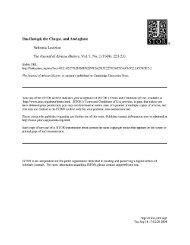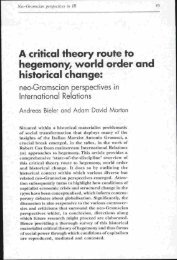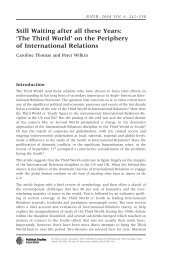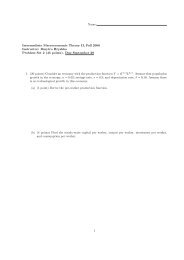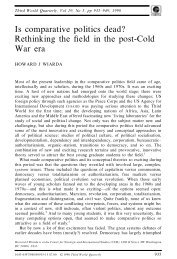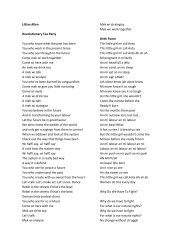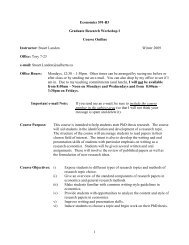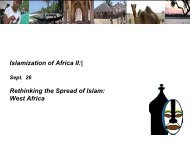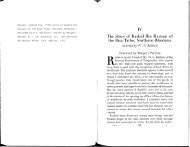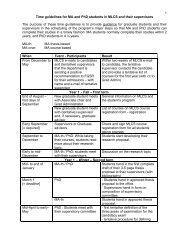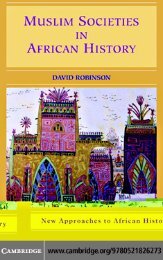2 Ethnocentric Projection and the Study of Kinship
2 Ethnocentric Projection and the Study of Kinship
2 Ethnocentric Projection and the Study of Kinship
You also want an ePaper? Increase the reach of your titles
YUMPU automatically turns print PDFs into web optimized ePapers that Google loves.
<strong>Ethnocentric</strong> <strong>Projection</strong> <strong>and</strong> <strong>the</strong> <strong>Study</strong> <strong>of</strong> <strong>Kinship</strong> … May 2008 4<br />
Table 1<br />
Five Positive <strong>and</strong> Negative Features <strong>of</strong> <strong>the</strong> New <strong>Kinship</strong> Studies<br />
Ra<strong>the</strong>r than discussing each <strong>of</strong> <strong>the</strong>se features in turn, <strong>and</strong> in so doing repeating much <strong>of</strong><br />
what can be found in <strong>the</strong> work mentioned above, I want simply to register two points. The<br />
first is <strong>the</strong> separability <strong>of</strong> <strong>the</strong> members <strong>of</strong> each <strong>of</strong> <strong>the</strong>se pairs <strong>of</strong> features. Although each <strong>of</strong><br />
<strong>the</strong>se positive-negative pairs cohere, <strong>and</strong> <strong>of</strong>ten have been endorsed toge<strong>the</strong>r, one could<br />
accept <strong>the</strong> positive member <strong>of</strong> each pair without also accepting <strong>the</strong> corresponding negative<br />
member. The second is that <strong>the</strong> initial paired features above—attention to <strong>the</strong> cultural<br />
construction <strong>of</strong> kinship <strong>and</strong> <strong>the</strong> subsequent dismissal <strong>of</strong> biological notions <strong>of</strong> kinship—are<br />
<strong>the</strong> most central to <strong>the</strong> cluster <strong>of</strong> features <strong>the</strong>y characterize. They also form a prominent<br />
part <strong>of</strong> Schneider’s critique <strong>of</strong> kinship studies. Underst<strong>and</strong>ing this central thread to<br />
Schneider’s critique, particularly his dismissal <strong>of</strong> biological notions <strong>of</strong> kinship, should shed<br />
light on contemporary work on kinship, <strong>and</strong> its self-conscious distancing from traditional<br />
studies <strong>of</strong> kinship within anthropology.<br />
3. Schneider on <strong>Kinship</strong><br />
I have already noted that <strong>the</strong> study <strong>of</strong> kinship recurrently reoriented itself <strong>and</strong> probed<br />
its own foundations as it developed from <strong>the</strong> 1860s on. Yet it was only in <strong>the</strong> 1970s that <strong>the</strong><br />
critical reflection here ga<strong>the</strong>red sufficient sweep <strong>and</strong> momentum to constitute a challenge to<br />
<strong>the</strong> status <strong>of</strong> kinship within anthropology, something resulting in a Kuhnian paradigm shift<br />
in <strong>the</strong> field. We can distinguish two components to this challenge, one internal <strong>and</strong> one<br />
external to kinship studies. The first came from leading figures within kinship studies, such<br />
as Rodney Needham <strong>and</strong> David Schneider, <strong>and</strong> <strong>the</strong>se feature prominently in <strong>the</strong> narratives<br />
that anthropologists have provided <strong>of</strong> <strong>the</strong> sea change in kinship studies. Schneider’s views,<br />
culminating in his A Critique <strong>of</strong> <strong>the</strong> <strong>Study</strong> <strong>of</strong> <strong>Kinship</strong> (1984), connected with <strong>the</strong> external<br />
component to this challenge, which included developments elsewhere within anthropology<br />
(e.g., <strong>the</strong> rise <strong>of</strong> symbolic anthropology) as well as in <strong>the</strong> broader academic climate (e.g., <strong>the</strong><br />
emergence <strong>of</strong> feminist perspectives on gender, <strong>the</strong> family, <strong>and</strong> social structure). Some brief<br />
comments on Needham’s challenge should allow us to underst<strong>and</strong> something <strong>of</strong> <strong>the</strong> context<br />
<strong>of</strong> Schneider’s, by way <strong>of</strong> contrast.<br />
In his “Remarks on <strong>the</strong> Analysis <strong>of</strong> <strong>Kinship</strong> <strong>and</strong> Marriage”, Needham summarized<br />
his briefly stated views <strong>of</strong> kinship in that paper, as he says, “bluntly”: that “<strong>the</strong>re is no such<br />
thing as kinship, <strong>and</strong> it follows that <strong>the</strong>re can be no such thing as kinship <strong>the</strong>ory” (1971: 5).<br />
Three features <strong>of</strong> Needham’s view here are worth noting, especially in contrast with those<br />
that Schneider developed. First, Needham’s reasons for this conclusion were explicitly<br />
Wittgensteinian, appealing to <strong>the</strong> philosopher’s cautionary reminders about <strong>the</strong> search for<br />
essences <strong>and</strong> criterial meaning that were simply not to be found, <strong>and</strong> drawing on<br />
Wittgenstein’s famous examples <strong>of</strong> games <strong>and</strong> family resemblances. As such, <strong>the</strong>y nei<strong>the</strong>r<br />
found nor created a context within anthropology for <strong>the</strong>ir reception. Second, Needham<br />
made no attempt to link his views here to “external” developments elsewhere in<br />
anthropology or academia more generally. And third, this denial <strong>of</strong> “kinship” <strong>and</strong> <strong>of</strong><br />
“kinship <strong>the</strong>ory” was not accompanied by methodological or practical changes in how one<br />
regarded ei<strong>the</strong>r kinship or kinship <strong>the</strong>ory, <strong>the</strong> message seemingly to be simply to stop <strong>the</strong><br />
meta<strong>the</strong>oretical h<strong>and</strong>-wringing about kinship <strong>and</strong> continue with one’s ethnological work.



